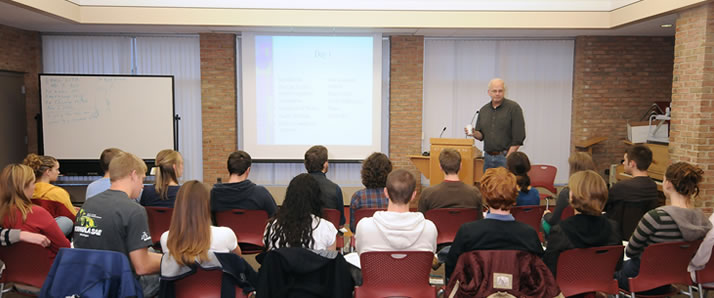Eight years ago Dan Vandersteen saw a need.
As pornography use, awareness and recovery tactics grew in the early 2000s, Vandersteen and resident director Andy Gammons realized that the problem bled even into Calvin College.
And with that, Step One was born.
“Our mission was to try and help guys who are addicted to pornography, and [trying to] be free from its use,” says Vandersteen, a current counselor at the Broene Counseling Center.
Gammons has since moved on from the program, but Vandersteen continues to run Step One through Broene, and believes the program is vital at a Christian institution.
“There’s a tremendous amount of shame and guilt associated with pornography among the Christian community,” Vandersteen stated.
“Christians don’t really talk about it, and parents just tell their kids not to do it, often times without even explaining what it is.”
Whether or not Vandersteen’s presumptions about communication are correct, studies do show that pornography is still prevalent among the church.
According to reports by Christianity Today, most churchgoers list pornography as the most sexually damaging issue in their congregations. This is affected not only by its members, but by its pastors as well, as the magazine reports multiple studies in which over half of the pastors surveyed had viewed pornography in the last year.
Studies also indicate that pornography is also widespread among college students. One such study by the University of New Hampshire in 2008 estimated that nearly half of all college males watch porn weekly.
Studies such as these give Vandersteen indication that there are far more students struggling with the issue than the 25 students or so that benefit from the program yearly.
“They’re ashamed,” Vandersteen suggested when asked why more students don’t utilize the program. “A lot of students think that God couldn’t love them after they do something like that, but sin can’t separate us from God.”
The program focuses on mending that disconnect, using a plethora of Bible passages and reinforcing messages to communicate with students the love that God has for them.
But Vandersteen stresses that this alone won’t fix the problem.
“God can forgive you, you can forgive yourself, but when you look another person in the eye and acknowledge the problem, that’s when healing really begins,” Vandersteen said.
Students work toward healing through weekly group sessions and finding accountability partners.
“We talk about how we got into pornography, how it got into our lives, how to be porn free and give help when relapsing,” explained Vandersteen.
The pornography addiction, like any addiction, is a cycle, as Vandersteen put it. There are different stages that cyclically draw people in. Fortunately, those same stages provide different ways to escape the cycle.
The program’s goal is to help students find those escape points, and then work on healing and relapse prevention. According to Step One’s recent yearly evaluations, 89 percent of students report that their pornography use has decreased after going through the program.
While no program can be perfect, Vandersteen is confident that the program is successful on many levels for students who participate.
The program focuses on men, whom Vandersteen says struggle with pornography far more. However, the counselors at Broene do deal with women who are struggling on an individual level. The center also offers a program for women who’s significant other deals with the addition. The program is called Striders and is run by Cynthia Kok.
For more information on the either program, or to get involved, visit the Broene Counseling Center inside Spoelhof College Center.








